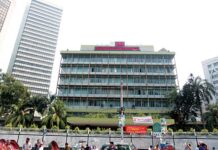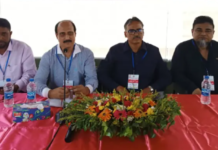
The implementation of the 44-kilometre Dhaka-Tongi-Joydebpur rail line under an Indian line of credit (LoC) has made progress of 31.2 per cent since its construction began 11 years ago.
Other infrastructure projects being funded by India are also facing delays and upward cost revisions.
To resolve the issues, the Economic Relations Division (ERD) holds regular meetings with line ministries and Indian contractors and other officials, but the pace of implementation has been slow.
Since 2010, India has disbursed 10.03 per cent of the $7.36 billion pledged as loans.
So far, 46 projects have been taken up under three Indian LoCs, of which 14 projects related to the procurement of buses, trucks and other vehicles were completed.
The remaining 32 projects are suffering from slow implementation.
Officials of the relevant ministries and the ERD blamed bureaucratic red-tape, the terms of the LoCs, inexperience and a lack of planning for the delay. Taking on too many projects has also been a principal cause.
“India has no experience in providing large loans to any country other than Bangladesh,” said Ahsan H Mansur, executive director of the Policy Research Institute.
Besides, the Indian bureaucrats want to handle the matter very cautiously, which causes a massive holdup, he said.
When bureaucrats have experience in dealing with government-to-government project funding, negotiations move very fast, he added.
Mustafizur Rahman, a distinguished fellow of the Centre for Policy Dialogue, said that completing certain formalities before implementing the projects under Indian LoCs was very time-consuming.
“But the dawdling pace is not just because of the problems of donors but also that of Bangladesh,” Rahman said.
It has been observed that while the projects identified by Bangladesh under the three LoCs do address the country’s infrastructure and procurement needs, the speed of implementation, particularly for the infrastructure projects, has been relatively slow.
These delays have led to cost escalations, which also disrupt the optimality of other related projects. This, in turn, is undermining the potential benefits of these projects.
“So, both Exim Bank of India and the concerned agencies in Bangladesh should be more proactively engaged in resolving these problems to ensure speedy implementation,” Rahman said.
The recently constituted high-level body tasked with monitoring the progress of LoC-funded projects will hopefully be able to make a difference in this regard, he added.
The process of securing approval to implement a project is different for India compared to other development partners, according to ERD officials.
For example, for the projects bankrolled by bilateral and multilateral lenders, including China, the World Bank and the Asian Development Bank, approval must be taken from the Executive Committee of the National Economic Council (Ecnec) before loan agreements are signed.
However, India announces the financing commitment before finalising the project list. The detailed project plans, feasibility study and approval from the Ecnec are done afterwards.
Project implementation in Bangladesh typically faces delays at the execution level. Besides, in each stage of a project, the Bangladesh side needs to take approval from the Indian authority.
According to Indian procurement conditions, at least 75 per cent of the goods and services required for a project should be bought from the neighbouring nation. At most, this may be relaxed to up to 65 per cent.
Officials of the implementing agencies said that such a condition was one of the major obstacles to the delay in project implementation.
An ERD official said they were in talks with the Indian side to relax the conditions.
When it comes to projects funded by China, a Chinese company must be selected as the implementing agency, which proceeds aggressively to complete the work, said an official of Bangladesh Railways on condition of anonymity.
But in the case of India-backed projects, a tender is floated to appoint a contractor, which is a time-consuming process.
Then, the Indian contractor appoints local sub-contractors to complete different components of the project, a process that also creates problems.
“The bureaucracy in India is almost the same as in Bangladesh,” he added.
Under the first LoC involving $862 million, 12 out of 15 projects have been completed. Two of the 15 projects under the second LoC, involving $2 billion, were implemented so far.
Meanwhile, none of the 16 projects under the third and the largest LoC, involving $4.5 billion, have been completed.
Under the first LoC, the $78.10 million Kulaura-Shahbazpur railway line project achieved physical progress of 25 per cent over the last 11 years.
Similarly, the Khulna-Mongla railway project involving $399 million saw the progress of 75 per cent. The implementation has been delayed by the cyclone Amphan and the ongoing Covid-19 pandemic.
ERD officials earlier said that India would disburse $40 million per year against the LoCs, but the process slowed down in 2020 due to the coronavirus outbreak.
However, they hope to raise the amount to $150 million this fiscal year.
RECENT INITIATIVES
According to finance ministry officials, the implementation of the projects under the LoCs has remained stagnant since April last year due to Covid-19.
To fast-track implementation, discussions were held between the two sides during Indian Foreign Secretary Harsh Vardhan Shringla’s visit to Dhaka in August last year.
Since then, the implementing ministries, the ERD and the Cabinet Division have become more proactive. Besides, a high-level monitoring committee was formed to expedite the implementation.
The ERD secretary and the Indian high commissioner to Bangladesh will lead their respective sides in the committee.









